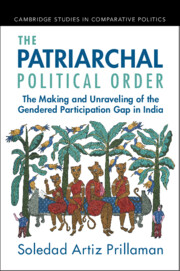 The Patriarchal Political Order
The Patriarchal Political Order from Part II - The Patriarchal Political Order
Published online by Cambridge University Press: 30 November 2023
Chapter 5 shows that power within the household and autonomy from the household most strongly predict women’s political participation. Using data from a census survey, it estimates the determinants of women’s (and men’s) political participation. Comparing within households, bargaining power is associated with women’s non-electoral political participation, though not their voting. Comparing within villages, autonomy from the household is a clear predictor of women’s political participation. In fact, the behavior of women who enjoy a high degree of autonomy from the household mirrors that of men. It also provides suggestive evidence that intra-household coercion plays a role in women’s political participation by showing a lack of correlation between political interest and participation in the household for women but not men and a negative correlation between regressive gender attitudes of the dominant male household member and women’s political participation.
To save this book to your Kindle, first ensure [email protected] is added to your Approved Personal Document E-mail List under your Personal Document Settings on the Manage Your Content and Devices page of your Amazon account. Then enter the ‘name’ part of your Kindle email address below. Find out more about saving to your Kindle.
Note you can select to save to either the @free.kindle.com or @kindle.com variations. ‘@free.kindle.com’ emails are free but can only be saved to your device when it is connected to wi-fi. ‘@kindle.com’ emails can be delivered even when you are not connected to wi-fi, but note that service fees apply.
Find out more about the Kindle Personal Document Service.
To save content items to your account, please confirm that you agree to abide by our usage policies. If this is the first time you use this feature, you will be asked to authorise Cambridge Core to connect with your account. Find out more about saving content to Dropbox.
To save content items to your account, please confirm that you agree to abide by our usage policies. If this is the first time you use this feature, you will be asked to authorise Cambridge Core to connect with your account. Find out more about saving content to Google Drive.